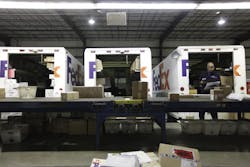Geller (at left) explained that two kinds of human decision making are involved when we contemplate buying something: the instinctive or “fast” part of the human psyche and the analytical or “slower” part.
“Instinctive decision making is our default; it wins out over analytical,” he said on the show. “This is our biology and its sole purpose is self-preservation. Any time our anxiety level goes up we cut spending and increase savings. Thus when we are safe, we spend; but when we are scared, we save. This is instinctively wired in; we can’t help it [and] it’s very hard to get out of it.”
All well and good, but how does this relate to freight, much less trucking?
Geller noted that consumer spending is usually the single major driver of the economy – representing 70% of the country’s annual gross domestic product (GDP). “We have a great economy but it is very fragile,” he said, as dips in consumer spending – for whatever reason – directly affects U.S. economic growth as a whole.
And as we all know, economic growth – or the lack of it – directly affects freight volumes.By his calculation, Geller noted that a 5% reduction in personal consumption would decrease GDP by 3.5%. Given that U.S. economic growth topped 2% in the third quarter, such a reduction in consumer spending would send growth into reverse; creating negative 1.5% GDP.
“Any type of economic or financial fear can elevate money anxiety; and this is a very normal and very common phenomenon [that] can vary in level,” Geller emphasized. “The thing is, when money anxiety increases, we default to instinctive decision making; and that is when we reduce our spending.”
Of course, one of the biggest fears of late revolves around the growing threat of terror attacks. Although holiday spending ended up staying relatively strong this year, the concern is that heightened fears over terrorism puts that instinctive “don’t spend” trigger on a tripwire.
Indeed, an online survey of 2,252 U.S. adults conducted in early December by The Harris Poll found that terrorism currently leads the list of issues Americans want to see government action on, with 24% of those polled naming it – without prompting – among the top issues for the government to address.
That represents fourfold growth since November of 2014 when just when 6% named terrorism as a top issue and is on par with December 2001, when 22% of Americans named this issue in the wake of the September 11, 2001 terror attacks.Terrorism is far from the only worrying issue on American minds, according to data from this Harris Poll survey, as the health of the U.S economy is behind it by only the narrowest of margins, with 23% naming it as a top concern, down marginally from 25% a year ago.
Of course, if fear about terrorist attacks on shopping malls and the like grows, Geller noted that tapping e-commerce to purchase goods won’t quite fill that gap.
“It circumvents only part of the money anxiety issue [because] the other part of the fear is to actively hold on to money; to increase savings and cut spending,” he explained during his radio interview “It’s the principal of ‘mattress money’ so when anxiety is high, we want to feel that money is close to us in liquid accounts such as checking and savings accounts. People make this instinctive decision just to feel money that money is available to them if they need it.”
Thought there’s little trucking can do to assuage such feelings, it’s worth keeping how they impact economic trends in mind as we head towards the New Year.



